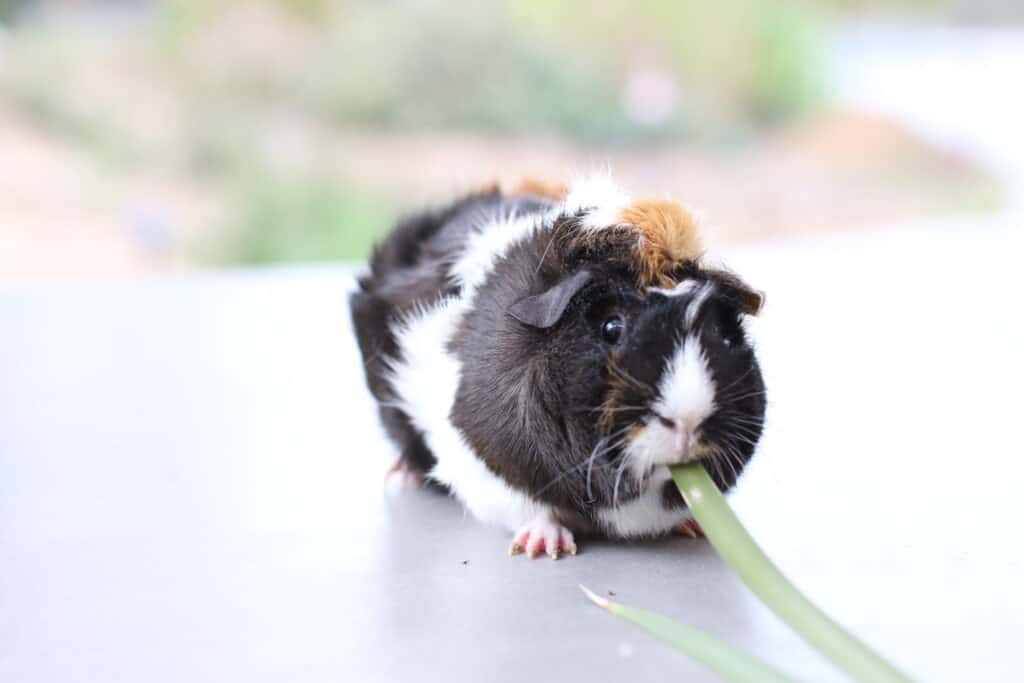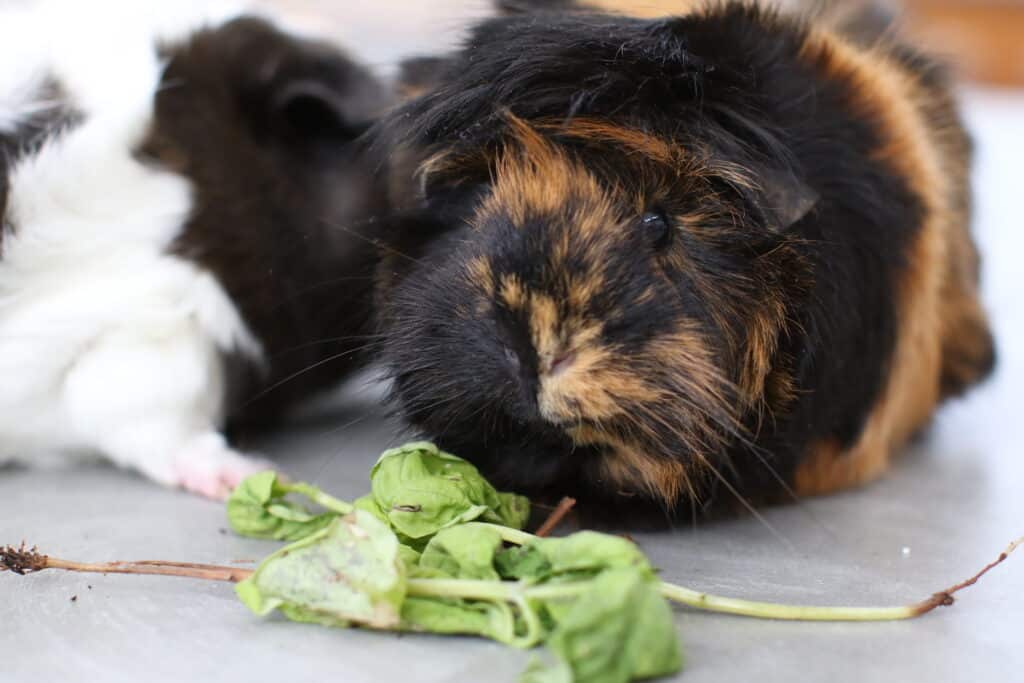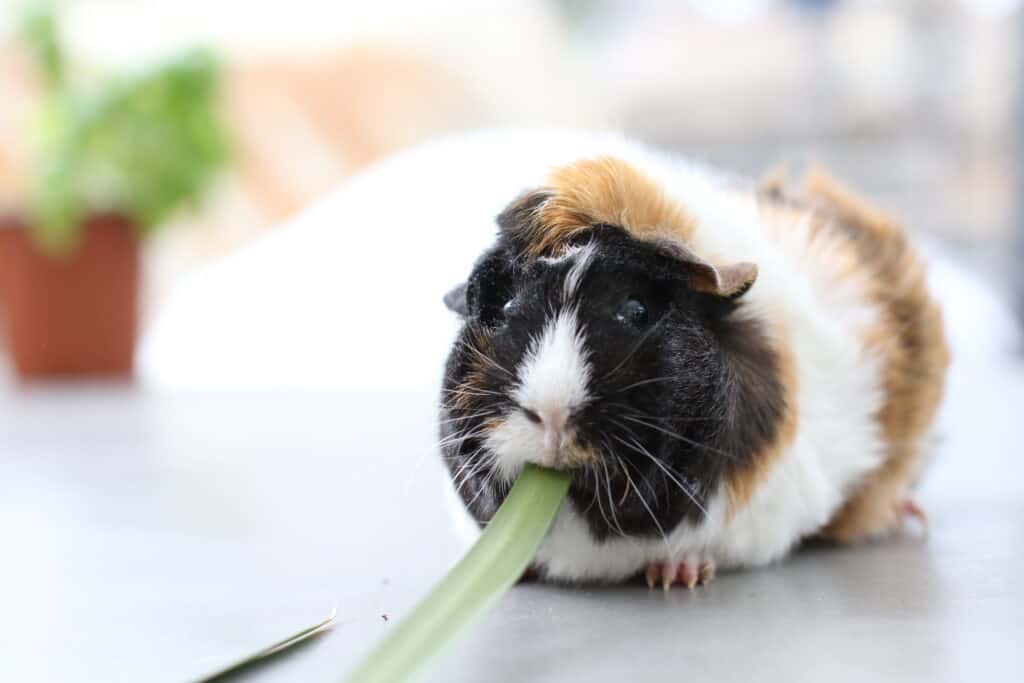As an Amazon Associate we earn from qualifying purchases.
It’s a question that has crossed the minds of many guinea pig owners – can you overfeed a guinea pig? The answer, unfortunately, is yes. Overfeeding a guinea pig can lead to health problems, including obesity and diabetes. This blog post will discuss what overfeeding is, the health risks associated with overfeeding, and what to do if your guinea pig becomes overweight.
What Is Overfeeding?
Overfeeding occurs when a guinea pig consumes more calories than they need. This can happen if the guinea pig is given too much food or if the guinea pig food they are given is high in sugar or fat. Guinea pigs need a high fiber diet and low in sugar and fat, so overfeeding them can lead to health problems.

Can You Overfeed a Guinea Pig?
Yes, you can overfeed a guinea pig. Overfeeding a guinea pig can lead to health problems, including obesity and diabetes. Guinea pigs are prone to obesity, so keeping guinea pig’s diet in check is important. If your guinea pig becomes overweight, you will need to change its diet and exercise routine.
Health Risks Associated with Overfeeding?
The risks associated with overfeeding include:
Obesity
Overweight guinea pigs are more likely to suffer from health problems such as heart disease, respiratory problems, and joint pain.
Diabetes
Guinea pigs that consume too much sugar can develop diabetes. This can lead to weight loss, increased urination, and dehydration.
Liver Disease
Fatty liver disease is a common problem in overweight guinea pigs. This can lead to jaundice, weight loss, and death.
Urinary Tract Infection
Overweight guinea pigs are more likely to develop urinary tract infections. This can cause pain, increased urination, and blood in the urine.
Imbalance Of Gut Bacteria
An imbalance of gut bacteria can lead to digestive problems, weight loss, and death.
What To Do If Guinea Pig Is Overweight?
If your guinea pig is overweight, there are a few things you can do to help them lose weight:
- Feed them a diet that is high in fiber and low in sugar and fat
- Give them plenty of exercises
- Limit their food intake
Overfeeding Prevention Tips
To prevent your guinea pig from becoming overweight, follow these tips:
Measure Their Food
To ensure you are not overfeeding your guinea pig, measure their food and give them the recommended amount.
Give Them a Variety of Foods
A variety of foods will help your guinea pig get the nutrients they need without consuming too many calories.

Monitor Their Weight
Monitor your guinea pig’s weight and talk to your veterinarian if you are concerned about their weight. It is important to monitor your guinea pig’s weight so you can catch any weight gain early.
Every week, you should weigh your guinea pig and record their weight in a notebook. This will help you track their progress and make sure they are losing weight safely.
By following these tips, you can help prevent your guinea pig from becoming overweight or obese. If your guinea pig is already overweight, talk to your veterinarian about the best way to help them lose weight.
Guinea pigs are susceptible to health problems associated with obesity, so it is important to take action if you think your guinea pig is overweight.
How Much Should Guinea Pig Weigh?
A healthy guinea pig should weigh between 700 and 1200 grams. If your guinea pig weighs more than this, it may be overweight. To find out for sure, take your guinea pig to the vet.
Your veterinarian can help you create a weight loss plan for your guinea pig that is safe and effective. You can help your guinea pig lose weight and improve their health by following this plan.
How Much Food Can Guinea Pigs Eat?
Guinea pigs can eat various foods, but the amount of food they need will vary depending on their age, weight, and activity level. A good rule of thumb is to give your guinea pig about ½ cup of food per day.
This will ensure that they get the nutrients they need without consuming too many calories. They can eat vegetables, fruits, hay, pellets, and water.
How Often Should Guinea Pigs Eat?
Guinea pigs should eat every day. They can have small meals throughout the day or one large meal. It is important to monitor their food intake and make sure they are not overeating.
Talk to your veterinarian if you are concerned that your guinea pig is not eating enough. They can help you determine if your guinea pig is getting the nutrients they need and make recommendations for changes to their diet.
Healthy Vegetables For Guinea Pigs
Some fresh vegetables that are good for guinea pigs include:
Carrots
Carrots are a good source of Vitamin A and fiber. They should be given in moderation because they are high in sugar.
Cucumbers
Cucumbers are a good source of water and fiber. You can feed guinea pigs daily.
Green Beans
Green beans are a good source of Vitamin C, iron, and fiber. They should be given in moderation because they are high in sugar.

Bell Peppers
Bell peppers are a good source of Vitamin C and fiber. They can be given to guinea pigs daily.
The best way to ensure that your guinea pig is getting the nutrients they need is to give them a variety of foods. This will also help prevent them from becoming bored with their food.
Healthy Fruits For Guinea Pigs
Some healthy fruits that are good for guinea pigs include:
Apples
Apples are a good source of Vitamin C and fiber. They should be given in moderation because they are high in sugar.
Bananas
Bananas are a good source of potassium and fiber. They can be given to guinea pigs daily.
Blackberries
Blackberries are a good source of Vitamin C and antioxidants. They can be given to guinea pigs daily.
Cantaloupe
Cantaloupe is a good source of Vitamin C and water. It should be given in moderation because it is high in sugar.
Conclusion
Yes, you can overfeed a guinea pig if you give them too much food or if they eat too much of one particular type of food. It is important to monitor guinea pig treats and diet and ensure they get the nutrients they need.
Talk to your veterinarian if you are concerned that your guinea pig is not eating enough. They can help you determine if your guinea pig is getting the nutrients they need and make recommendations for changes to their diet.
If you think your guinea pig may be overweight, take them to the vet for a check-up. Your veterinarian can help you create a weight loss plan for your guinea pig that is safe and effective. You can help your guinea pig lose weight and improve their health by following this plan.
Guinea pigs are fun, active pets that need a variety of foods to stay healthy. By monitoring their diet and giving them the right amount of vegetables, fruits and guinea pig pellets you can help your guinea pig stay healthy and happy.